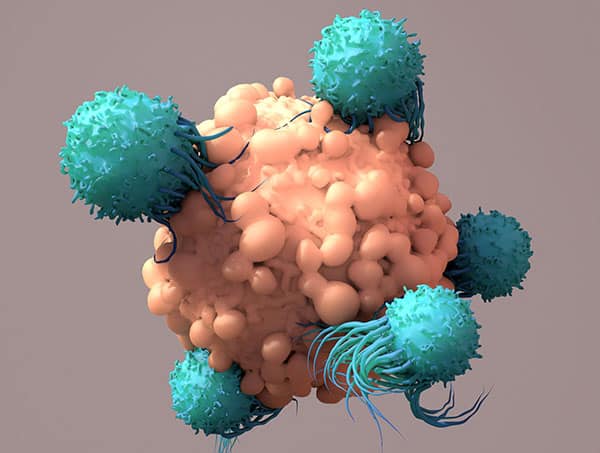Second-line CAR T Therapy for Patients with B-cell Lymphoma
The CAR T-cell therapy lisocabtagene maraleucel was approved for the second-line treatment of certain patients with large B-cell lymphoma.
The U.S. Food and Drug Administration (FDA) has approved lisocabtagene maraleucel (Breyanzi) for the second-line treatment of patients with large B-cell lymphoma (LBCL) whose disease stopped responding or relapsed within 12 months of first-line chemoimmunotherapy; or whose disease stopped responding or relapsed after first-line chemoimmunotherapy and are not eligible for hematopoietic stem cell transplantation. Patients with primary central nervous system lymphoma are not eligible.

Lisocabtagene maraleucel is a chimeric antigen receptor T-cell (CAR T) therapy, a type of immunotherapy in which a patient’s T cells are removed, modified to express a receptor that will recognize proteins on cancer cells, and delivered back into the patient. Lisocabtagene maraleucel recognizes a protein called CD19, which is expressed in all B-cell cancers, including LBCL. Binding of lisocabtagene maraleucel to CD19-expressing cells results in the activation and proliferation of the CAR T cells, release of immune-stimulating molecules, and killing of the CD19-expressing cells, which include both normal and cancerous cells.
The approval is based on results from the open-label, multicenter, phase III TRANSFORM trial and the single-arm, open-label, multicenter, phase II PILOT trial.
The TRANSFORM trial enrolled 184 adult patients with LBCL that was refractory to first-line therapy or that had relapsed within 12 months of having a complete response to first-line therapy. Patients received lisocabtagene maraleucel following a chemotherapy regimen or received standard second-line therapy. Patients treated with lisocabtagene maraleucel had significantly longer event-free survival than those in the control arm (10.1 months vs. 2.3 months). Forty-five percent of patients in the lisocabtagene maraleucel arm were event-free one year after treatment, as compared with 24 percent of patients treated with standard therapy.
The PILOT trial evaluated lisocabtagene maraleucel in patients with relapsed or refractory LBCL who were ineligible for high-dose therapy and hematopoietic stem cell transplant. Fifty-four percent of patients who received lisocabtagene maraleucel had a complete response. The median duration of response was not reached at the time of data collection in patients who had a complete response. Patients who had a partial response had a median duration of response of 2.1 months.
Lisocabtagene maraleucel carries a risk of fatal or life-threatening toxicities; therefore, the FDA approved the treatment with a Risk Evaluation and Mitigation Strategy.
Lisocabtagene maraleucel was previously approved for use in patients with LBCL who had received at least two prior lines of systemic therapy.
LBCL is a cancer of B cells, a type of immune cell that produces antibodies. LBCL is a type of non-Hodgkin lymphoma, which is estimated to be newly diagnosed in almost 80,500 individuals in 2022 in the United States.
The FDA rendered its approval on June 24, 2022.
